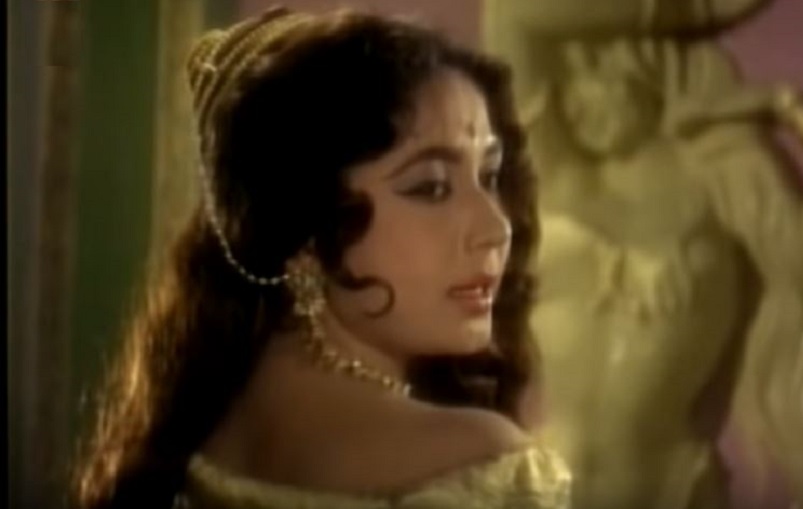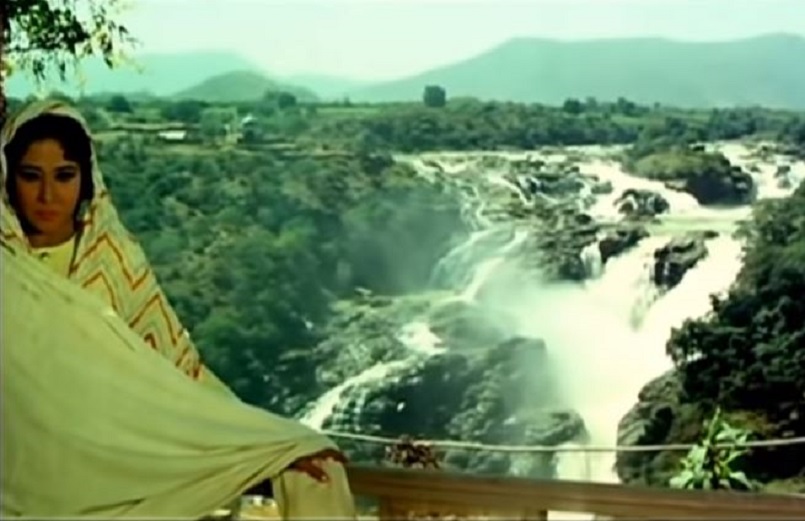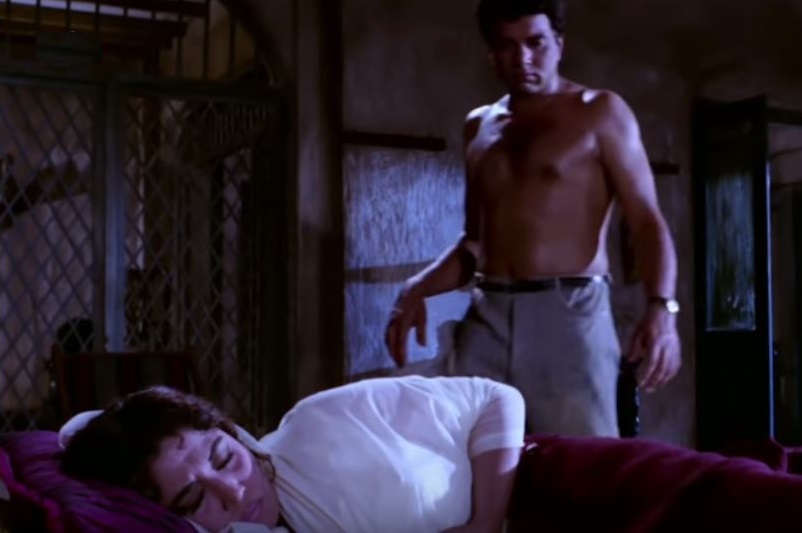Meena Kumari
This is a collection of articles archived for the excellence of their content. |
Contents |
The person
Meena Kumari: Lesser known facts
Meena Kumari ruled celluloid until her death in 1972. Her seductive voice and charismatic screen presence captured millions of hearts. Her life was nothing less than a roller coaster ride. From passion, romance, love, success to tragedy - she witnessed all of these in her real life too. Director Tigmanshu Dhulia has roped in Kangana Ranaut to essay the role of Meena Kumari in her biopic. On her death anniversary, let's take a look at the lesser known aspects of her life.
Debut at the age of 4: Because of her strikingly good looks, Meena Kumari started working at the age of 4, to help support her family. She became a common face at various studios. Meena made her acting debut at the age of 7, as a child actor in Farzande Watan. She played the daughter of Jairaj Singh in the movie. In the year, 1950, she also played Jairaj Singh's love interest in the film Maghroor.
Changed her name: Meena Kumari was born in 1932. Her father, Master Ali Bux had migrated from Bhera. Her mother, Iqbal Begum, was a Bengali Christian who converted to Islam. Meena Kumari's original name was Mehajabeen Naaz. The director of Farzande Watan, Vijay Bhatt, changed her name to Baby Meena for his movie. Once she grew up, she became popularly known as Meena Kumari.
Meena Kumari as a Hindu goddess: Prior to acting in films, Meena Kumari had become a regular face in Hindu mythological shows. Meena used to be roped in for many mythological shows, and she used to play Hindu goddess in most of these shows. After she made her way into the industry, there was no looking back for the actress. She quoted high fees and producers used to wait outside her house. She gained financial independence and there was no pressure on her to compromise with the roles she was offered.
Closeness to Gulzar: Meena Kumari had no formal education, but she was quite well versed in Urdu and Hindi. She was an ardent reader. She also used to write poems in Urdu, many of which even got published. Her love for poetry also brought her closer to Gulzar.
Kamal Amrohi: In Meena's words, Kamal Amrohi was the perfect man for her. They used to write letters to each other, talk on phone all night. Meena's family was against the idea of her tying the knot with Kamal. And thus, one night, Meena moved to Kamal's apartment unannounced. The duo got married in a private ceremony. However, Meena Kumari's growing popularity became a problem in their love nest. Kamal had imposed many restrictions on her. After a marriage that lasted for almost a decade, the couple parted ways.
Meena Kumari's obsession for white: Meena Kumari was not a party person. In her biography, Vinod Mehta has described that Meena used to get bored at such events. But she mostly attended all the events and parties in a particular white saree. The book also states that Meena Kumari had decorated her house mostly with white objects.
Meena Kumari and Dharmendra
Men who loved and left Meena Kumari
Chandrima Pal, Mumbai Mirror | Aug 15, 2013
[1] The biography
Kumari's biography could well revive conversations about men who loved and left her
Veteran journalist Vinod Mehta's biography of Meena Kumari, first published in 1972, was written at a time when biographies were few and far between, and stars
While most of Meena Kumari's co-stars and colleagues easily opened up to the charismatic writer (except Dharmendra with whom she was rumoured to be having an affair), Mehta found the domestic helps, the drivers and the make-up artists to be the most resourceful. "They had no axe to grind, and I had no reason to disbelieve them," he says.
During the four months that he researched for and wrote the book, Mehta was drawn to his heroine's multi-faceted personality. "Unlike today's stars, she had many dimensions - she read poetry, had literary friends, aspired to the higher life and was an alcoholic. She also represented that generation of young Muslim girls who were pushed into the film industry so that they could become their family's meal tickets. Meena Kumari's family too exploited her and felt betrayed when she married KamalAmrohi," he says. Meena Kumari also thought of herself as a Marilyn Monroe, "unlucky and unloved," says Mehta, adding that "she drank because she wanted to get drunk, not because she enjoyed it."
EXCERPT
Meena-even after she had stopped seeing Dharmendra had great regard for him. There were two reasons for this: One, Mr Dharam was her protege, her pupil. She had helped him enormously in the initial stages of his career, and she took legitimate pride when he made good. Dharam himself has never tried to minimise the debt he owes to Meena for making him what he is today.
Two, He was among the very few men who were genuinely good to her. In real life I believe he is a thoroughly decent and unpretentious guy, and he thought a lot of my heroine. (Each time he went to see her in Landmark, he would come out of her room crying. Khursheed once asked him why. 'I can't help it,' was his simple and honest reply.) The popular view is that Meena and Dharam were intimate for three years. The inside view is that the intimacy lasted no more than six months.
While it lasted, however, it glittered and in six months this couple had given rise to rumours enough for many years. No denying that Dharam enjoyed the limelight. He was an unknown boy and his liaison with India's foremost actress got him a lot of grantis publicity. Most of the time he was visibly at her side and when he was not, he made sure this news travelled.
He had gone to Delhi for the premiere of Kaajal, and at some party there downed a couple of excess drinks. When he arrived at the airport, the authorities noticing his inebriated state, refused to let him in the plane. 'But I must get back to Bombay. I must,' he entreated, 'Meena is waiting for me'. This statement and incident were faithfully reported in the press the next day. My heroine did not fall short either. She had gone in a convoy to a picnic with lots of friends among whom was Mr Dharmendra. While returning, somehow Dharam got inside a different car from Meena and whisked away. She was hysterical. She wanted to know why he wasn't in the car beside her. She wanted to know whether he had run away. She wanted to know if something had possibly happened to him. The other picnicker s assured that all was well with Dharam and through an oversight he had left in one of the other cars. But this assurance wasn't enough. Meena directed the driver of her car to stop. He did. Coolly she got out of the car and went onto the middle of the road. Here, cross-legged, she sat and began lamenting loudly, 'Where is my Dharam? Where is my Dharam?'
If you were involved with Meena, that automatically meant that you were involved in fairy-tale fiction. Dharam received his share. A slapping incident is rumoured, a full-scale fist fight between Mrs Dharmendra and my heroine in Shrinagar is rumoured, a couple of drinking incidents where Meena had to stabilise her man are rumoured.
-Excerpt from Vinod Mehta, Meena Kumari, The Classic Biography, Published by Harper Collins
Obituary by Nargis: ‘Congratulations on your death’
Why Nargis said ‘Meena, Maut Mubarak Ho!’, December 2, 2018: The Times of India
The Mother India actress wrote a piece on Meena Kumari’s death in 1972 which was published in an Urdu magazine. Excerpts from a translation by Yasir Abbasi
Happy Birthday. Wishes for your wedding. Happy Diwali. Eid Mubarak. I have often offered as well as received these wishes on numerous occasions. But… “Congratulations on your death” I have neither heard nor said this earlier. Meena, today your baaji [elder sister] congratulates you on your death and asks you to never step into this world again. This place is not meant for people like you… Meena always called me ‘baaji’. It’s so strange that despite being in the same profession and staying not too far away from each other, we didn’t meet for several years… One day I received a call from my husband who was away in Madras shooting for Main Chup Rahungi. Since it was going to be a long schedule, he asked me to come over with the kids. I reached Madras with Sanjay, who was two and a half years old then, and Namrata, who was barely two months old. Meena’s room was close to ours. Accompanying Meena was her sister Madhu and also Baqar Ali (Kamal Amrohi’s assistant)... She greeted me as soon as she saw me and said, “I have great regard for you and I hope you won’t mind if I call you ‘baaji’.” An instant friendship developed between us.
Once, Dutt saheb wanted to go out for Chinese food and an invitation was extended to Meena too but she said that she was tired after the day’s work and had already eaten early. She also offered to take care of the kids while we were away.
When we returned at 11 o’clock, the kids’ nanny informed us that both the children were still with her. Entering her room quietly, I saw both of them asleep on either side of Meena. The nanny told us that Meena had duly tended to all the duties — from taking Sanjay to the toilet to changing Namrata’s nappies and from preparing their feeding bottles to singing them loris… We didn’t meet for several days after that but one night I saw her walking in the garden of the hotel. She was panting and when I asked her the reason, she said, “Baaji, I eat tobacco and sometimes that results in palpitations.”
“Meena, this is not due to tobacco,” I told her. “You look very tired. Why don’t you rest for a while?”
“Baaji, resting is not in my destiny. I will rest just one time...”
That night there was some noise in Meena’s room — sounds suggestive of violence. Next day we came to know that she wasn’t feeling well and would not report for work. Once Sunil had left, I went to her room. Her eyes were swollen and I could sense that she had cried a lot… I caught hold of Kamal saheb’s secretary Baqar and spoke to him in direct terms, “Why do you people want to kill Meena? She has worked enough for your sake... For how long is she going to feed you?” Baqar saheb replied, “Baby (Nargis’s nickname), why don’t you understand? When the right time comes, we will rest her…”
We couldn’t meet for a long time once we were back in Bombay… but one day I heard that she had walked out of Kamal saheb’s home and had started living in Mehmood’s house (Mehmood was married to her sister). Meena had a showdown with Baqar on the sets of Pinjre Ke Panchhi and matters got so turbulent that she did not step into Kamal saheb’s house again… The stories about her alcoholism had begun to surface… Soon enough, excessive consumption of alcohol had weakened her liver and she was down with jaundice. When I visited her at Saint Elizabeth Nursing Home, I was careful that I didn’t mention anything that could embarrass or hurt her… Then, mustering some courage I added, “Manju (Meena’s nickname), you are free, but of what use is such freedom when you are bent upon killing yourself ?” She replied, “Baaji, my patience has a limit. How dare Kamal saheb’s secretary raise his hand on me? When I got the incident communicated to Kamal saheb, I thought he’d come running and immediately fire Baqar, but he said, ‘Come home and I will decide things here.’ What was there for him to decide? Now it’s me who has decided to not go back to him…”
Then, a new person entered Meena’s life — Dharmendra. She was so happy — it was almost as if she had got hold of the entire wealth of the world… If Meena has ever loved anyone passionately, the person is Dharmendra. If Meena has ever turned crazy in love for someone, it is for Dharmendra.
This was the most beautiful phase of her life. However, the good times were short-lived as a misunderstanding resulted in the two of them drifting apart. Dharmendra walked out of her life and left her heart-broken. She couldn’t cope up with the loss and hit the bottle… She would say, “Baaji, solitude is my destiny. I do not pity myself and neither should you.” Slowly, Meena started to inch towards death.
Excerpted with permission from Yeh Un Dinoñ Ki Baat Hai: Urdu Memoirs of Cinema Legends by Yasir Abbasi, Bloomsbury India
Filmography
As an actor
1939 Leatherface
1940 Ek Hi Bhool
1940 Pooja
1941 Bahen
1941 Kasauti
1941 Nai Roshni
1942 Garib
1943 Pratiggya
1944 Lal Haveli
1946 Bachchon Ka Khel
1946 Duniya Ek Sarai
1947 Piya Ghar Aaja
1948 Bichchade Balam
1949 Veer Ghatotkach
1950 Anmol Ratan
1950 Hamara Ghar
1950 Magroor
1950 Shri Ganesh Mahima
1951 Hanumaan Pataal Vijay
1951 Lakshmi Narayan
1951 Madhosh
1951 Sanam
1952 Aladdin Aur Jadui Chirag
1952 Baiju Bawra
1952 Tamasha
1953 Daera
1953 Dana Paani
1953 Do Bigha Zamin
1953 Foot Path
1953 Naulakha Haar
1953 Parineeta
1954 Baadbaan
1954 Chandni Chowk
1954 Ilzam
1955 Adil-E-Jahangir
1955 Azaad
1955 Bandish
1955 Rukhsana
1956 Bandhan
1956 Ek-Hi-Rasta
1956 Guru Ghantal
1956 Halaku
1956 Jayam Manade
1956 Mem Sahib
1956 Naya Andaz
1956 Shatranj
1957 Miss Mary
1957 Sharada
1958 Farishta
1958 Sahara
1958 Savera
1958 Yahudi
1959 Ardhangini
1959 Chand
1959 Chirag Kahan Roshni Kahan
1959 Four Faces of India
1959 Jagir
1959 Madhu
1959 Satta Bazaar
1959 Shararat
1960 Bahaana
1960 Dil Apna Aur Preet Parai
1960 Kohinoor
1961 Bhabhi Ki Chudiyan
1961 Pyaar Ka Saagar
1961 Zindagi Aur Khwab
1962 Aarti
1962 Main Chup Rahungi
1962 Sahib Bibi Aur Ghulam
1962/I Dakshayagnam
1963 Akeli Mat Jaiyo
1963 Dil Ek Mandir
1963 Kinare Kinare
1964 Benazir
1964 Chitralekha
1964 Gazal
1964 Maain Bhi Ladki Hun
1964 Sanjh Aur Savera
1965 Bheegi Raat
1965 C.I.D
1965 Jadui Angoothi
1965 Kaajal
1965 Purnima
1966 Phool Aur Patthar
1966 Pinjre Ke Panchhi
1967 Bahu Begum
1967 Chandan Ka Palna
1967 Majhli Didi
1967 Noorjehan
1967 Sudigundaalu
1968 Abhilasha
1968 Baharon Ki Manzil
1969 Buddimantudu
1970 Jawab
1970 Saat Phere
1971 Dushman
1971 Mere Apne
1972 Pakeezah
1972 Gomti Ke Kinare
Poetry
Tanha Chaand [the lonely moon] a collection of Urdu poems written under the name Naaz
Discography
I write, I recite an album cut with Polydor (Music India Ltd) and available on YouTube and YouTube2



